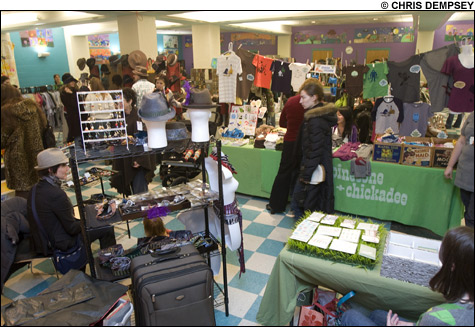
DOWNRIGHT NEIGHBORLY: The weekly arts and crafts boutique Design Hive encourages local talent to market their wares close to home. |
This is how I imagine Main Street at the North Pole right about now. Mom and Pop elves dash from store to store in a scramble to finish their holiday shopping. They load up on knickknacks and tchochkies (assuming there are Jewish elves in the community) from the locally owned Santa's Workshop. There are no chain stores here. At the top of the world, hard-earned dollars are spent in neighborhood stores, whose store owners then spend and invest them with other local businesses.
Perhaps that's why Santa's Village isn't going through a recession.
Back here in the temperate zone, the local and national economies are in the crapper. Big businesses such as Circuit City, Tweeter, and Linens-N-Things are closing their doors; to save gas, city dwellers have stopped driving to the malls out in Burlington, Natick, and Leominster. The only upside of this downturn is that shoppers are returning to their neighborhood stores.
And just in the nick of time. Boston may yet end up looking a bit like the Pole of my imagination this December. Minus the Jewish elves.
After a sluggish 2007 holiday spending season, the national Independent Business Forum (IBF) surveyed local businesses in all 50 states and in Washington, DC. Despite news that local businesses are hardest hit when the economy stalls, the businesses surveyed reported steady earnings. Some showed even modest gains.
With a decidedly gloomier year-end shopping picture projected for 2008, that news provides at least a glimmer of hope to Boston-area businesses and communities. "This is really an opportunity for small downtowns to recapture that market that kind of went out of style because people were busy, had no time to build relationships, and could find better deals at the chain stores," says Christopher Ryan, the man otherwise known as the Localizer.
By day, Ryan is the director of planning and development for the town of Ayer (population 6871). He lives in nearby Concord where, he says, he plans to do most of his holiday spending this year. "Last year, we were buying things like sleeping bags and camping equipment from the mall," he says. "This year, there's a store in West Concord that we'll go to. It's a little more expensive than places like EMS [itself once a local business —ed.], but dealing with your local merchant is important in building up your local economy." On his blog, Ryan advocates buying locally made goods and produce, creating local businesses, and localizing energy production.
(He also recommends using local currency such as BerkShares, the barter-like instrument of commerce circulating in the Southern Berkshires, but one glance at berkshares.org is enough to know this idea isn't coming to Boston any time soon.)
According to the IBF study, locally owned businesses have held relatively steady for two reasons: paranoid and cash-strapped spenders want to keep their money close to home and various Buy Local campaigns have raised public awareness of the benefits of supporting hometown enterprises. (Local First campaigns have recently been launched in Cambridge, Roslindale, and Worcester.)